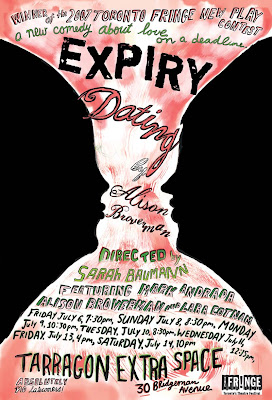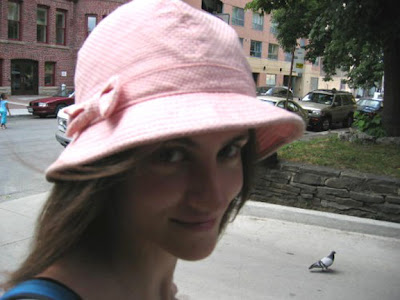 1) What the fuck is going on?
1) What the fuck is going on?
I’ve been laying pretty low for the past few months, actually, recovering from an intensely exhilarating summer (my first Fringe show! Yikes!). Writing about this and that, seeing as much theatre as I can, very quietly working on my second play. Oh, and a friend of mine and I recently started teaching 8-to-11-year-olds how to write plays, which is probably the greatest thing I have done in my life so far.
2) Do you have any unifying theories that inform your approach to arts reporting for The National Post?
No theories that can be summed up in a tidy little nutshell, but I do try to always be supportive of the artist or event in question without being fawning, and I try to design the story so it will inspire readers to go out and buy a ticket. One thing I find extremely frustrating about writing about theatre in Toronto is how repetitive it often feels: the same people doing the same plays all the time. I try not to encourage that by giving it ink. But I’m hopeful that it’s starting to change, though – a few younger, fresher voices are starting to make their way onto the city’s mainstages, and I hope that the trend keeps up.
3) What can independent theatre companies do to make their stories more appealing to local arts reporters?
Don’t be boring. Have a good angle. My editors love a good angle. And proofread your press releases. Good lord.
 4) After spending years reviewing Toronto Fringe shows for Eye Weekly and The Post, how did it feel to mount your own show in last year’s festival?
4) After spending years reviewing Toronto Fringe shows for Eye Weekly and The Post, how did it feel to mount your own show in last year’s festival?
It was terrifying, but really wonderful. I finally understood why artists treated me the way they did in the years I was working as a reviewer. I felt very exposed, but it was such a great experience – I realized that I want to create art more than I want to write about other people’s art. And ultimately, the show sold out its run and was chosen for the Best of the Fringe series, so that felt pretty damn awesome.
5) How do you feel about a theatre critic’s power to make or break a show?
A critic should not have the power to make or break a show, but unfortunately audiences are extremely cheap and lazy and are all too happy to give them that power. I have been really dissatisfied with how theatre criticism works in this city for quite some time now – the ego surrounding it is so, so huge, and no wonder. In a job like that, where you’re paid to be judgmental, it’s easy to turn into an asshole and develop an inflated sense of your own importance. The challenge is to maintain your modesty and realize that the most important part of your job is to create a tangible record of an ephemeral experience and, maybe, introduce your readers to something new and wonderful that they might otherwise have dismissed. Anton Ego, the ominous food critic in Ratatouille, has a monologue at the end of the film that sums up exactly how I feel about criticism:
“In many ways, the work of a critic is easy. We risk very little yet enjoy a position over those who offer up their work and their selves to our judgment. We thrive on negative criticism, which is fun to write and to read. But the bitter truth we critics must face is that in the grand scheme of things, the average piece of junk is more meaningful than our criticism designating it so. But there are times when a critic truly risks something, and that is in the discovery and defense of the new. The world is often unkind to new talent, new creations, the new needs friends.”
 6) How have your experiences with blogs and social media influenced your ideas about theatre?
6) How have your experiences with blogs and social media influenced your ideas about theatre?
I don’t know that they have, really. I would really like to see more theatre folks blogging, as Daniel MacIvor does, about their work, about what they think about other work they see, about the conversations they have. The problem with theatre criticism in Toronto, specifically, but in general, is that it’s so unilateral – I would like to see theatre blogs used (as you guys do here) to create more of a conversation about theatre.
In the Post every Friday I edit the Popcorn Panel, where three panelists – film critics, film lovers, whoever – discuss a recent film in a casual, conversational way. I WISH I could do the same thing for theatre – you know, every week round up a few people – a theatre writer, a theatre artist, a theatre student, whoever – and chat about a play. It would be so great to get theatre artists talking about each other’s work more.
7) If you could change one thing about mainstream media’s coverage of theatre in Canada, what would it be?
I’d hire a lot of young, enthusiastic (and mostly female – sometimes I feel like the only girl around) arts reporters who don’t yet feel like they’ve seen it all and who still think theatre is fun and exciting. And I’d start up that theatre version of the Popcorn Panel that I just talked about.
 8) As a writer, what are you better at now than you were when you were younger?
8) As a writer, what are you better at now than you were when you were younger?
Just writing. When I was younger I had a lot of big ideas that never went anywhere. Having a regular writing gig at the Post forced me to write more regularly, and faster, and my brain just got used to a higher output mode. I don’t think it was an accident that I finished my first play that year, when I was writing more frequently than I’d ever written before.
9) How much of your work is informed by a sense of anger?
Honestly, not much. Heartbreak, often, but not anger. At least, not yet.
10) Who are some of your favourite contemporary theatre artists?
I think Hannah Moscovitch is the best thing to happen to Toronto theatre in a long time, and I hope she keeps it up. Mabou Mines’ balls out production of A Doll’s House blew me away at Harbourfront’s New World Stage Festival last year. It feels redundant to say Daniel MacIvor, because who doesn’t think he’s the bees’ knees, but Daniel MacIvor. Oh, and this 8-year-old comic genius from my playwriting class last fall. He wrote the funniest line I have ever heard in my life: “She’s not my girlfriend, she’s a hobo!” And he also wrote a very moving monologue about being in trouble in the principal’s office. Watch out for him.
Holy crap! I’m fully stealing “She’s not my girlfriend, she’s a hobo!” but…you know….making it gay.
I have a little professional crush on Alison. La la la.
great interview
so much to talk about…
alison, i agree with so much of what you have to say about what’s going down in the t dot: problems with repetitiveness, the hope that up-and-comers offer, a passion for things that are new! (and i never use exclamation marks.)
i think a popcorn panel type thing for theatre would be a great idea. one thing though, it would likely be hard to get artists to talk publicly about other artist’s work. pretty much everyone just did a show with, used to date or submitted grant with everyone else. or not. the point is: small community. it would be hard to get anyone to put out anything approaching negative press about their peers when they didn’t like something. we are much more sophisticated in our vendettas.
oh, and i just started teaching teens how to make plays this year. frig it’s awesome.
“the new needs friends”… agreed.
There’s lightness of touch to Alison’s responses that’s just lovely.
Oooh, lovely comments on my interview! Yay!
I had such a great time answering these excellent questions and was honoured to be featured on your fabulous site. Thank you!
As far as peer review goes, it certainly does present a political challenge, getting artists to talk about one another’s work in a public forum. Maybe if we all thought of it as taking criticism back from the critics?